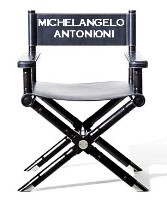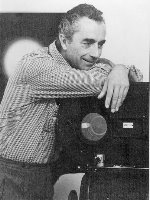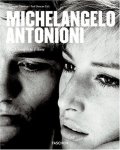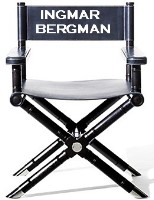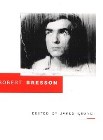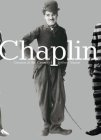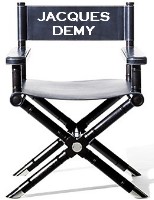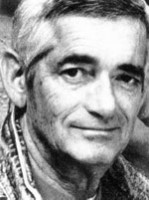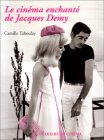
Michelangelo Antonioni • Ingmar Bergman • Robert Bresson • Luis Buñuel • John Cassavetes • Charlie Chaplin • Jean Cocteau • Jean-Pierre & Luc Dardenne • Vittorio De Sica • Jacques Demy • Carl Th. Dreyer • Victor Erice • Rainer Werner Fassbinder • Federico Fellini • John Ford • Louis Feuillade • Samuel Fuller • Howard Hawks • Alfred Hitchcock • Hou Hsiao-hsien • Shohei Imamura • Aki Kaurismäki • Abbas Kiarostami • Krzysztof Kieslowski • Hirokazu Kore-Eda • Shunji Iwai • Stanley Kubrick • Akira Kurosawa • Fritz Lang • David Lean • Ernst Lubitsch • David Lynch • Terrence Malick • Anthony Mann • Jean-Pierre Melville • Kenji Mizoguchi • Lukas Moodyson • F. W. Murnau • Mikio Naruse • Yasujiro Ozu • Sergei Parajanov • Roman Polanski • Otto Preminger • Michael Powell & Emeric Pressburger • Satyajit Ray • Jean Renoir • Jacques Rivette • Nicolas Roeg • Eric Rohmer • Roberto Rossellini • Mrinal Sen • Douglas Sirk • Alexander Sokurov • Andrei Tarkovsky • Bela Tarr • Jacques Tati • Hiroshi Teshigahara • Jacques Tourneur • Anh Hung Tran • François Truffaut • Tsai Ming-liang • Edgar Ulmer • Agnès Varda • Luchino Visconti • Erich von Stroheim • Peter Weir • Orson Welles • Wim Wenders • Wong Kar-wai • William Wyler • Zhang Yimou
|
|
||
|
|
|
Michelangelo Antonioni's films are known for capturing erratic moments of uncertainty and moral disorientation within his characters sterile identities. They are often being tempted by the modern trappings of self-absorbtion. His unique cinematographic style utilized long tracking shots of human isolation contrasted against an austere or bleak background terrain. The natural landscapes would absorb the characters plying them into a more vulnerable state while emotionally separating them from their traditional bearings. Described as a 'quintessential modern artist' Antonioni is a fervent expressionist who utilized intense haunting imagery. This is where he crafted a totally new cinema language - one frequently described as both pioneering and revolutionary. |
|
|
||
|
Suggested Reading (click cover or title for more info)
Michelangelo Antonioni |
Director - Selected filmography and review links:
Identification of a Woman (1982), Mistero di Oberwald, Il (1981), The Passenger (1975), Zabriskie Point (1970), Blowup (1966), Red Desert (1964), L'Eclisse (1962), La Notte (1961) , L'Avventura (1960), Il Grido (1957), Le Amiche (1955) |
|
|
|
||
|
|
|
One of the more important figures of modern film, a gifted cinematic artist, Ingmar Bergman continued to venture into exciting narrative and thematic areas in his directorial career. Almost defining his own genre Bergman probed the heights and depth of human emotion. His work was influential on entire generations of filmmakers around the globe. His primary concerns crossed over from spiritual conflict while probing the fragility of the human psyche. Within this framework, he has crafted a body of work universally celebrated for its technical innovations while exploring the human condition. Bergman is quoted as saying "No form of art goes (as far) beyond ordinary consciousness as film does, straight to our emotions, deep into the twilight room of the soul." |
|
|
||
|
Suggested Reading (click cover or title for more info)
The Films of Ingmar Bergman (Cambridge Film Classics) |
Director - Selected filmography and DVDBeaver links:
Fanny och Alexander (1982), From the Life of the Marionettes (1980), Autumn Sonata (1978), The Serpent's Egg (1977), Face to Face (1976), The Magic Flute (1975), Scenes from a Marriage (1973), Cries and Whispers (1972), The Passion of Anna (1969), The Rite (1969), Shame (1968), Hour of the Wolf (1968), Persona (1966), The Silence (1963), Winter Light (1963) , Through a Glass Darkly (1961), The Devil's Eye (1960), The Virgin Spring (1960), The Magician (1958), Wild Strawberries (1957), The Seventh Seal (1957), Smiles of a Summer Night (1955), Summer with Monika (1953), Summer Interlude (1951) |
|
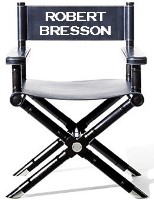 |
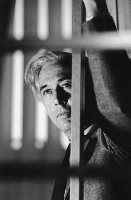 |
Robert Bresson occupies a unique place in cinema, certainly too inaccessible for the established mainstream viewer and quite separate from his countrymen and contemporaries attached to the French New Wave. He fervently explored the theme of redemption in his increasingly idiosyncratic and bare minimalist style with flat austere images, vague descriptions, lack of flowing narrative and often unrealistic dialogue further emphasized by the use of purposely expressionless non-professional actors (he calls them 'models'). Bresson rejected the artificiality and dependence of "photographed theater" with it's superficial reliance upon publicized performers and instead emphasized a pure, elliptical approach to narrative, making a masterful use of natural sound. His films are regarded as a demanding and difficult work to approach - intensely personal - leaving his cinema to never achieve great popularity. |
|
|
||
|
Suggested Reading (click cover or title for more info)
Robert Bresson (Cinematheque Ontario Monographs, No.
2) |
Director - Feature filmography and DVDBeaver links:
Argent, L' (1983) , The Devil Probably (1977), Lancelot du Lac (1974), Quatre nuits d'un rêveur (1971) Une femme douce (1969), Mouchette (1967), Au hasard Balthazar (1966), Procès de Jeanne d'Arc (1962), Pickpocket (1959), A Man Escaped (1956) , Diary of a Country Priest (1951), Les Dames du Bois de Boulogne (1945) Les Anges du péché (1943) |
|
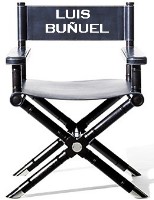 |
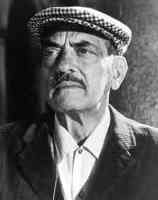 |
The father of filmic Surrealism and one of the most original directors in the history of cinema, Luis Buñuel was noted for his biting attacks on all social conventions from religion to sex to undisciplined wealth. His distinctive style and taste allowed his film to become the most memorable and enduring for viewers. With a Buñuel film you never knew the direction of but could be sure of anarchic precision with sardonic and hilarious comedic subtleties. He wrote a distinct and memorable autobiography (published posthumously entitled The Last Sigh), in which he informed the readers that he would burn every print of all the films he made without a regret - an embittered Surrealist gesture to the very end. |
|
|
||
|
Suggested Reading (click cover or title for more info)
by Luis Bunuel |
Director - Selected filmography and DVDBeaver links:
That Obscure Object of Desire (1977), Le Fantôme de la liberté (1974), The Discreet Charm of the Bourgeoisie (1972), Tristana (1970), The Milky Way (1969), Belle de jour (1967), Simon of the Desert (1965), Diary of a Chambermaid (1964), The Exterminating Angel (1962), Viridiana (1961), Nazarín (1959), The Criminal Life of Archibaldo de la Cruz (1955), The Adventures of Robinson Crusoe (1954), El (1953), El Bruto (1953), A Woman Without Love (1952), Susana (1951), Los Olvidados (1950), Las Hurdes (1933), L'Âge d'or (1930), Un chien andalou (1929) |
|
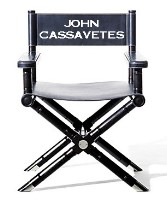 |
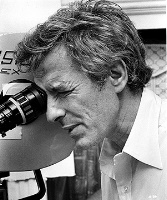 |
Regarded as the pioneer of American cinema verité, John Cassavetes experienced success as both an accomplished actor and an innovative filmmaker. He demonstrated courage as a director in his trail-blazing path of experimental, inexpensive features that were regarded as the American counterparts to the French New Wave. It has been stated that his cinema expressed a previously unrecognized form of stringent American modernism that went against the bleak and hollow forms of many artistic contemporaries. Cassavetes' films have strong links to the philosophical literature penned by Emerson and Dewy, most prominently as examples of the consequences of a life lived in its most pragmatic form. Cassavetes' work is celebrated with its ability to imbue both the metaphysical and existential revelations of communication through life experience. Much of his early work is considered a watershed in the birth of American independent cinema. |
|
|
||
|
Suggested Reading (click cover or title for more info)
Cassavetes on Cassavetes |
Director - Feature filmography and DVDBeaver links:
Big Trouble (1986), Love Streams (1984), Gloria (1980), Opening Night (1977), The Killing of a Chinese Bookie (1976), A Woman Under the Influence (1974), Minnie and Moskowitz (1971, Husbands (1970), Faces (1968), Too Late Blues (1961), Shadows (1959) |
|
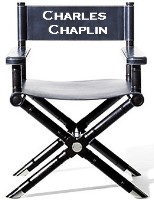 |
 |
Charles Chaplin's "Little Tramp" , with beaver-tooth mustache, bowler hat and bamboo cane, who struggled to survive whilst maintaining his dignity, is one of the most recognized, and enduring legends of cinema. Chaplin's prodigious work ethic behind the camera staggered his contemporaries. He made 35 pictures in one year alone. His first full-length film The Kid (1921) was followed shortly by A Woman of Paris (1923), and was fully produced and directed by himself. His influential creations (both narrative and often musical score), acting, directing, and producing films has never been equaled. His attention to detail could have him expand his project completions for months, often taking 6 weeks or more to shoot a scene of less than 30 seconds onscreen viewing. A gifted and dedicated athlete, Chaplin's onscreen physical comedy was again meticulously thought out and constantly re-examined. His 1931 "City Lights" is recognized today as one the greatest achievements in the history of cinema. |
|
|
||
|
Suggested Reading (click cover or title for more info)
Chaplin: Genius of the Cinema |
Director - Feature filmography and DVDBeaver links: A Countess from Hong Kong (1967), A King in New York (1957), Limelight (1952), Monsieur Verdoux (1947), The Great Dictator (1940), Modern Times (1936), City Lights (1931), The Circus (1928), The Gold Rush (1925), A Woman of Paris (1923), The Pilgrim (1923), The Idle Class (1921), The Kid (1921), Shoulder Arms (1918), A Dog's Life (1918), The Immigrant (1917), Easy Street (1917), A Dog's Life (1918), The Adventurer (1917/I), Easy Street (1917), The Rink (1916) |
|
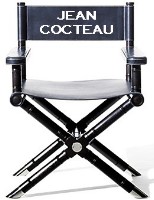 |
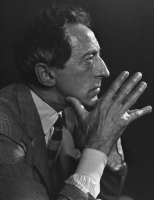 |
|
|
|
||
|
Suggested Reading (click cover or title for more info) The Art of Cinema by Jean Cocteau |
||
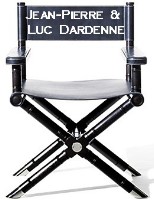 |
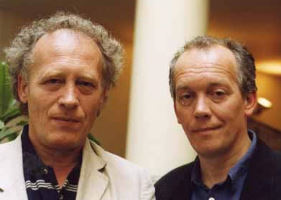 |
For over 20 years In Seraing, Belgium, brothers Luc and Jean-Pierre Dardenne produced/wrote and directed politically leftist documentary films. Their career of feature films hit international prominence in 1996 with La Promesse. Their next feature, Rosetta, another fictional story written and produced by them, won the top honors at Cannes in 1999. Constant reexamination in editing transmogrify their films to contain powerful realism expressions with social inequities often a central theme. This is a daring, gritty style very often with the use of handi-cam modulations. Their key attributes appear in two distinct forms - extensive hours spent on casting, and flexibility in production - often fearlessly migrating from details of their own initial story. |
|
|
||
|
Suggested Reading (FRENCH only)
Rosetta et la Promesse |
Director - Feature filmography and DVDBeaver links: L'Enfant (2005), Le Fils (2002) ... aka The Son , Rosetta (1999), Gigi, Monica... et Bianca (1997), La Promesse (1996), Je pense à vous (1992), Falsch (1987) |
|
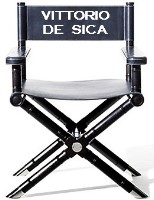 |
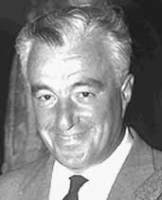 |
|
|
|
||
|
Suggested Reading (click cover or title for more info)
Vittorio De Sica: Director, Actor, Screenwriter |
Director - Feature filmography and DVDBeaver links: A Brief Vacation (1973), We'll Call Him Andrew (1972), Il Giardino dei Finzi-Contini (1970), I Girasoli (1970), Amanti (1968) Woman Times Seven (1967), After the Fox (1966), Un monde nouveau (1966), Marriage Italian-Style (1964), Yesterday, Today and Tomorrow (1963), Il Boom (1963), The Condemned of Altona (1962), Boccaccio '70 (1962), The Last Judgement (1961), Two Women (1960), Anna of Brooklyn (1958), The Roof (1956), The Gold of Naples (1954), Indiscretion of an American Wife (1953), It Happened in the Park (1953), Umberto D. (1952), Miracle in Milan (1951), The Bicycle Thief (1948), Shoe-Shine (1946), The Gate of Heaven (1945), The Children Are Watching Us (1944) |
|
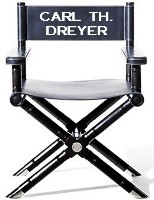 |
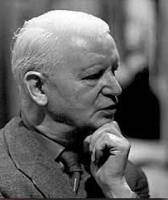 |
Director - Feature filmography and DVDBeaver links: Gertrud (1964), Ordet (1955), Storstrømsbroen (1950), Thorvaldsen (1949), They Caught the Ferry (1948), The Danish Village Church (1947), The Struggle Against Cancer (1947), Water from the Land (1946), Two People (1945), Day of Wrath (1943), Good Mothers (1942), Vampyr - Der Traum des Allan Grey (1932), La Passion de Jeanne d'Arc (1928), The Bride of Glomdal (1926), Master of the House (1925), Mikaël (1924), Der var engang (1922), Gezeichneten, Die (1922), Leaves Out of the Book of Satan (1921), The Parson's Widow (1920), Præsidenten (1919) |
|
|
||
|
Suggested Reading (click cover or title for more info)
Speaking the Language of Desire: The Films of Carl
Dreyer |
A strict Lutheran upbringing by an adoptive
family left influential and formative scars on illegitimate |
|
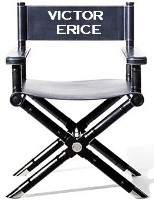 |
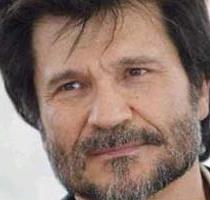 |
Spanish born Victor Erice has directed only three feature films (and three shorts) in a little over thirty years. His intelligent and visionary expression of cinema can aptly be described as deeply contemplative, allusive, allegorical and precise. Audio silence and camera pauses are rife in his small body of film which tend to give an aura of mystery and anticipation of grander events occurring. Erice's use of constantly long pans of passageways infer isolation, confinement and paranoia. His 'El Espíritu de la colmena ' (The Spirit of the Beehive) in 1973 won two international awards and announced his arrival on the cinema scene as a full feature director. Fans would have to wait a full decade before his 'El Sur' (The South) would be released and yet another 10 year span for his much heralded 'El Sol del membrillo' (Quince Tree of the Sun) in 1993. |
|
|
||
|
Suggested Reading (click cover or title for more info)
Open Window: The Cinema of Victor Erice
|
Director - Feature filmography and DVDBeaver links: El Sol del membrillo (1993), El Sur (1983), El Espíritu de la colmena ' (The Spirit of the Beehive) (1973) |
|
Michelangelo Antonioni • Ingmar Bergman • Robert Bresson • Luis Buñuel • John Cassavetes • Charlie Chaplin • Jean Cocteau • Jean-Pierre & Luc Dardenne • Vittorio De Sica • Jacques Demy • Carl Th. Dreyer • Victor Erice • Rainer Werner Fassbinder • Federico Fellini • John Ford • Louis Feuillade • Samuel Fuller • Howard Hawks • Alfred Hitchcock • Hou Hsiao-hsien • Shohei Imamura • Aki Kaurismäki • Abbas Kiarostami • Krzysztof Kieslowski • Hirokazu Kore-Eda • Shunji Iwai • Stanley Kubrick • Akira Kurosawa • Fritz Lang • David Lean • Ernst Lubitsch • David Lynch • Terrence Malick • Anthony Mann • Jean-Pierre Melville • Kenji Mizoguchi • Lukas Moodyson • F. W. Murnau • Mikio Naruse • Yasujiro Ozu • Sergei Parajanov • Roman Polanski • Otto Preminger • Michael Powell & Emeric Pressburger • Satyajit Ray • Jean Renoir • Jacques Rivette • Nicolas Roeg • Eric Rohmer • Roberto Rossellini • Mrinal Sen • Douglas Sirk • Alexander Sokurov • Andrei Tarkovsky • Bela Tarr • Jacques Tati • Hiroshi Teshigahara • Jacques Tourneur • Anh Hung Tran • François Truffaut • Tsai Ming-liang • Edgar Ulmer • Agnès Varda • Luchino Visconti • Erich von Stroheim • Peter Weir • Orson Welles • Wim Wenders • Wong Kar-wai • William Wyler • Zhang Yimou
![]()
![]()
![]()
![]()
DONATIONS Keep DVDBeaver alive and advertisement free:
Mail cheques, money orders, cash to: or CLICK PayPal logo to donate!
|
Gary Tooze
Mississauga, Ontario, CANADA |
|
Many Thanks...
